Ship Captain's Daughter (6 page)
Read Ship Captain's Daughter Online
Authors: Ann Michler Lewis

Mother loved to tell her favorite sailing story. It was about the time she started out for the bathroom when the ship was rolling one way, and how she had just made it to the bathroom door when it started to roll back the other way, which sent her flying across the floor until she hit the bathtub with her knees, causing her to lose her balance and, “head over teakettle,” fall into the tub. One time she told about going to pay a visit to Mr. Nageman, the tailor in Ashtabula who had pressed a hole into Dad's suit pants.
All the women talked about meeting ships. They talked about driving in fog and sleet and in the middle of the night, to docks not only in Duluth and Superior, but in Ashland, Wisconsin, and after the advent of taconite, to the new dock at Taconite Harbor, ninety miles up the shore from Duluth. Before the freeway was built and a tunnel drilled through Silver Cliff above the town of Two Harbors, it was often a dreaded ride. The road went around the outside of the cliff, perilously close to the edge, which hung right over the lake hundreds of feet below. Sometimes, if there was fog, they had to pull off before going around the treacherous curve and wait for the fog to lift. Mother told about the time she chanced it, even though there was a blind corner and she could not see the centerline.
The men talked about the amounts of their bonuses, the
bad storms, the dry docks where they had tied up, whom they hoped to get back for crew the next year, who was going to teach radar or navigation school or go to Florida for a few weeks to get away from the snow. Captain Coughlin told long stories and jokes.
“We were comin' into the Straits of Mackinac, you see, and there were sailboats everywhere and a stiff current, you see, and anaways, we were drawin' so deep that we were pullin' 'em in, so I got out the bullhorn and went out on deck and started yellin' and wavin' them away, and anaways, they finally got the message.”
Captain Coughlin did most of the talking, but every once in a while Captain Van Orman would say, “I'll be a son of a sea cook!”
I loved hearing the winter voices in the house.
Too soon, the days started to get longer, the orders arrived, and it was spring again. Preparations for departure began, and we went back on “sailing time.”
On the first Sunday in March, we drove from Duluth to Superior to attend the Mariners' Service at Pilgrim Lutheran Church. The church extended an open invitation to all the sailors in the Twin Ports to receive a blessing as they prepared to leave for another season on the lakes. My dad was always keen to be early, even though there was a reserved section. We all went, my Duluth grandparents (my mom's parents), my Superior grandparents (my dad's parents, who were always out on the front steps waiting for us to pick them up), my aunt and uncle, and my cousin Barbara, who lived just down the block.
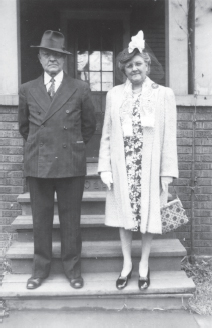
My grandparents stand on the front steps of their home in Superior, Wisconsin, anticipating with a tinge of sadness but glowing pride the annual church service blessing their son and local sailors as they prepared to sail off to sea in early March.
We all squeezed into one pew. The pastor began the service by reading the “Sailor's Psalm”: “Some went down to the sea in ships, doing business on the mighty waters; they saw the deeds of the Lord, his wondrous works in the deep.” Then we sang the hymn “Jesus, Savior, Pilot Me over Life's Tempestuous Sea,” after which my Grandma Michler passed along Kleenex and breath mints. Dad wore his best suit and a navy blue tie with little gold anchors on it. I could feel that people were looking at him and thinking he was handsome.
After the service, we gathered in the basement for a reception,
where the ushers served coffee and lemonade and cookies and cake. Grandma Michler always had her hair done with the bumps still showing from the rollers in the back. She wore her fanciest dress, her white gloves, and her new spring hat. She held Dad's arm tightly as she steered him all around, introducing him to everyone and reminding the minister and those friends of hers who happened to belong to this congregation that this was Willis Carl, that he sailed for The Interlake Steamship Company, that he was now a captain, and that he was her son. To my father and his family, to be recognized in this community was the crowning achievement. My grandfather just stood in the background and smiled.
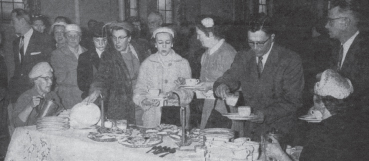
At the reception following the Mariners' Service at Pilgrim Lutheran Church in March 1957, my mother reaches for a plate, with me right behind her and Dad, far left.
PILGRIM LUTHERAN CHURCH, SUPERIOR, WI
In June, we could start using our allotted “sailing days.” At first, I looked forward to it. The older I got, however, the less excited I was about going aboard ship and spending days away from my friends. When I was old enough to go alone, my mother always insisted it would be good for me to go with Dad right after the school year ended. I knew it was coming. “Why don't you go aboard ship with your dad this trip? It would be nice for
you to spend some time together,” Mom said. “He's due in tomorrow about nine.”
I dreaded this. Dad had already told me that he was looking forward to me joining him as soon as school got out. I hated it, because I didn't want to disappoint him, but I didn't want to go. I had just seen the boy I'd liked all year ride by our house twice on his bike, and I had planned to sit on the front steps all week.
Reluctantly, I started to pack: books, cribbage board, cards, notepaper, wool sweaters, jeans, a heavy Lake Superior “summer” jacket, and pictures and addresses of my friends. With a sense of duty, I went.
We sailed out under the Aerial Bridge with happy fanfare. The tourists waved and ran alongside the ship until the end of the pier. Dad blew a salute, and we both waved back at them out the pilothouse window. This was the best part, when you felt like a celebrity, or at least a curiosity. Along the North Shore on London Road the big mansions and gardens looked grand as we sailed by, and the South Shore appeared as a thin line on the right. Then it all melted away as we headed out into the open water of Lake Superior, clear and calm today, but I knew you couldn't trust it.
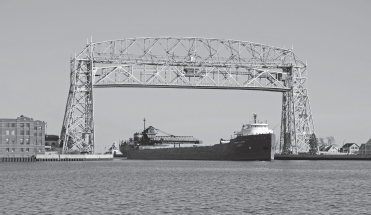
My father's ship, the SS
Herbert C. Jackson
, passes under the Aerial Bridge in Duluth, Minnesota.
DIANE HILDEN
Now Dad could leave the pilothouse. We went below to his quarters. When I looked out the porthole, all I could see was water and sky. I couldn't really tell which was which. Dad recorded the times of loading and leaving in the log, and then leaned back in his swivel desk chair to read the
Duluth News Tribune
and catch up on the hometown news. I started paging through my
Seventeen
magazine. The hot-water heaters ticked and banged, the inside getting hotter as the outside grew colder. There were hooks on everything. Porthole covers were fastened to the overhead, and the desk, chairs, couch, and end tables were fastened to the wall, and all the jiggling hooks croaked softly as the ship began to sway back and forth in the rising wind.
I asked Dad if he wanted to play cards, but I could tell by his eyes that he was slowly slipping into a nap. On arrival, after he had taken the ship through the pier and then the harbor and then maneuvered to the dock, he had come home and mowed the lawn, taken care of some business with Mother, run downtown to pick up some khaki pants and have his glasses adjusted, and now he had taken the ship back out through the close
waters. I could see that he was tired. He asked if it was okay to go into his room and lie down for a bit.
I played solitaire and cheated so I could win. After a few games, I took the inside stairway up into the pilothouse where the two-way radio chattered constantly with other ships, giving their locations and weather updates. When the ships were within range, the officers in charge said things like, “Where you bound? Over.” Or, “I hear you tied up behind the Sherwin at the Soo,” or, “How'd you ride out the wind off the Keweenaw Peninsula?” And then they might sneak in a little personal chatter: “How's the wife and kids?”
Everyone in the pilothouse smoked. If Duluth was their home port, they talked about the families and yards and dogs they had just seen for a couple of hours. I looked at the chart on the desk and traced the shipping lanes to find the one we were in.
Our orders were for Chicago, the Calumet River. I was hoping for Toledo or Cleveland so we could go through the St. Clair River and pretty Lake St. Clair, but not this trip. The Calumet River is tough, very narrow and crowded, with lots of turns and bridges, which meant Dad would be on his feet for long hours. The muscles in his cheeks would be tight, especially if he tried to save money and do it without a tug. Our arrival time was calculated as six p.m., better than one a.m., but not the best. And who knew if we would be delayed by weather somewhere?
Dad would be tired after doing the river, but he would take me ashore. We would probably borrow the dock boss's car and drive around a bit, or maybe take the elevated railway downtown and get back to the ship late, which was always scary, as the fiery steel mills looked and sounded like hell at night, and the path to the ship wound through dark piles of ore and screaming equipment.
Twenty-six hours after leaving Duluth, we would be locking down at the Soo, where the vendors would follow the ship
through the lock, selling newspapers, magazines, gum, candy bars, razors, soap, and other items. Everyone aboard ship always bought something, especially cigarettes. The transactions started on the level, but as the ship locked down, the money and items had to be thrown up and down, a skill perfected by both crew and vendors over many years.
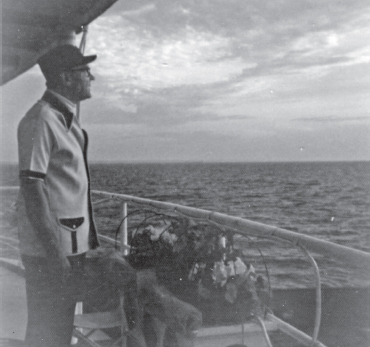
Dad searches the clouds for clues about the coming weather.
In the background, I heard the second cook's dinner bell as he walked around the after-cabin and then up forward. I went in and woke Dad up. He sat on the edge of the bed for a few minutes to get his bearings. After smoothing his thinning silver hair, he put on his captain's hat, then his navy blue jacket with the four gold stripes on the cuffs. I felt proud of him as we walked back. I felt proud to be the ship captain's daughter! He took his place at
the head of the table in front of the buffet with the mirror reflecting the plates of cherry cobbler, which were already set out. I sat in the first mate's place to his right. The mates had all moved down one place to make room for me, and the wheelsman who would normally sit at the end of the captain's side of the table went to eat in the mess hall for the next five days of the trip.
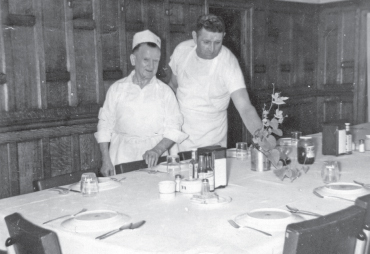
Mr. Gregory, left, was Dad's favorite cook. When I was very sick as a child, he sent me a cross with a little glass bubble in the middle through which I could read the Lord's Prayer.
The second cook, who was also the “waiter,” asked my dad how he would like his liver. It was their standard joke. My dad said what he always said: “Over the side.” Everyone laughed on cue. Dinner that night was roast beef served on an oval platter with carrots and peas in individual little round dishes all bearing the company flag and the initials PM for the Pickands Mather Company. In another little round dish there was an ice cream scoopâsized ball of mashed potatoes.
The chief, Mr. Tucker, was seated to Dad's left. He talked about his daughters, who were a year older and a year younger than I
was. Everyone talked a little about the load and about someone's finger that had gotten cut on a wire cable. After dinner we walked forward to Dad's quarters, laughing as we watched the seagulls trying to catch a ride on the mast. We climbed up to the second deck, making the steel rungs ring under our feet. When we turned on the TV, it was all snowy and buzzing, so we played a game of cribbage, and then it was time for bed. “It's sure nice having you here, Dolly,” Dad said, and then he went into his room on the starboard side, and I went into the guest quarters on the port side.
